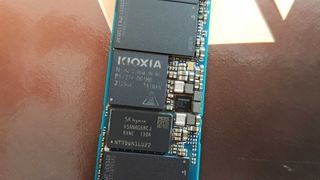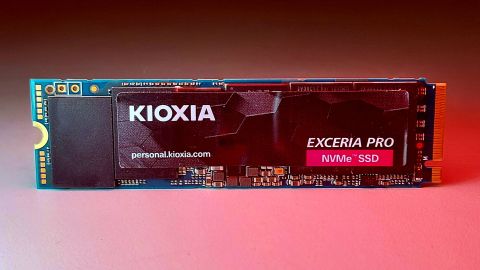Our Verdict
Strong synthetic performance fails to translate to great real-world throughput and the software situation is dire. Ultimately there are simply better SSDs available for this sort of money.
For
- Competitive pricing
- Strong synthetic throughput
Against
- Real-world performance off the pace
- Thermal throttling evident
- Lacks migration software
- Utility software doesn't support Windows 11
PC Gamer's got your back
Kioxia may not be a name as instantly recognisable as Western Digital or Samsung, but when you learn it used to be known as Toshiba Memory you'll realise you're in pretty safe hands. Kioxia has tended to focus on the affordable end of the storage market, and indeed we looked at the 2TB Exceria Plus a year ago and were generally impressed with it as a value proposition. Kioxia hasn't had a speedy PCIe 4.0 offering though, at least not until now.
The headline figures for the Exceria Pro are the sequential reads and writes of 7,300MB/s and 6,400MB/s, which means it's competitive with the very fastest drives around. Not only that, but Kioxia is offering solid value for money too, with this 2TB drive rolling in at just £237. That makes it one of the cheaper next-gen PCIe 4.0 drives around at just 12p/GB, although price cuts from other manufacturers do undermine this somewhat.
You do get a pretty basic drive for your money, with no migration software included in the package and no heatsink to speak of either. Not even a thin sheet of metal to help dissipate the heat. Just the bare drive, with the flash and RAM on one side with a simple sticker covering them. It's barebones, but as long as the performance lives up to the spec, then we can potentially live without the frills.
In terms of the core specifications, Kioxia has used its own 112-layer TLC BiCS NAND Flash for the drive, with a 2GB DDR4 RAM cache, and what appears to be a rebranded Phison E18 controller. This is the controller you'll find in some of the fastest drives around, like the Seagate FireCuda 530 and Kingston Fury Renegade. This is cheaper than both of those premium offerings though.
As ever you're going to need a PCIe 4.0 platform to get the most from this drive, either an AMD Zen 2 or Zen 3 CPU and motherboard, or an 11th or 12th Gen Intel CPU and supporting motherboard. If you're still rocking a PCIe 3.0 PC, you can still use this drive, although the performance will be limited to 3,500MB/s due to the interface's limitations. There are much cheaper PCIe 3.0 drives available if this is the case too.








Model: LSE10Z002TG8
Capacity: 2,000GB
Interface: PCIe Gen 4 x4
Format: M.2 2280
Controller: Rebranded Phison E18
NAND: Kioxia 112-layer BiCS TLC
Rated seq. read: 7,300MB/s
Rated seq. write: 6,400MB/s
Endurance: 800TBW
Warranty: 5 years
Price: £237
In theory, this should be one of the fastest drives around, with quoted peak reads and writes up there with the best drives. In practice, there's little on offer here to make this drive stand out from the crowd, with reasonable, if unspectacular throughputs across the range of benchmarks. It isn't a slow drive, not by any means, but it also doesn't trouble the quoted sequential throughputs either.
The similarly-configured Sabrent Rocket 4 Plus (2022) outperforms it in every test, and our favourite SSD, the WD Black SN850, is also the better option for anyone looking for premium performance. I've also included the recently released WD Black SN770 in the comparisons, which offers up better real-world performance despite being a DRAM-less drive.

In testing, I also witnessed significant thermal throttling. Running the ATTO benchmark three times in quick succession saw the throughput drop off significantly. The first run produced figures that you would expect, and can be found in the graphs above, but by the third run, the performance was down to less than 3GB/s as opposed to the 6GB/s of the initial run. It's a punishing test that doesn't necessarily replicate a real-world scenario, but no other drive I've looked at recently suffered the way this did.
I've recently been running these drives recently without extra cooling to see if they throttle, and for the most part, while they get hot, they've not had any issues. The problem here is that even when using the heatsink that shipped with the motherboard, I still witnessed over-eager throttling with the temperatures hitting 73°C. That may be well below the maximum operating temperature of 85°C, but still, the throttling was clear.




Given the acceptable, if not exactly stunning performance, and the problems with thermal throttling it only seemed logical to check whether there was a firmware update to get the drive performing as it should. This can happen with new drives, and generally, it's easily fixed by downloading the manufacturer's software to check the state of the SSD and make sure everything is working as intended.
Herein lies another problem with the Kioxia Exceria Pro—the wonderfully titled SSD Utility Management Software does not support Windows 11. Surprising given this is 2022 and Windows 11 is not exactly new anymore. As it is, running the utility provides very limited functionality, with no option for updating the drive's firmware directly.
Overall, the Kioxia Exceria Pro 2TB NVMe SSD has its issues but is generally a reasonable offering. The thing is, the PCIe 4.0 SSD market is pretty mature now, and there are simply better drives out there. The WD Black SN770, by way of example, is cheaper and offers better real-world performance. There are faster high-end drives available too for roughly the same cash—the WD Black SN850 can be had for £231 right now.
Strong synthetic performance fails to translate to great real-world throughput and the software situation is dire. Ultimately there are simply better SSDs available for this sort of money.
Alan has been writing about PC tech since before 3D graphics cards existed, and still vividly recalls having to fight with MS-DOS just to get games to load. He fondly remembers the killer combo of a Matrox Millenium and 3dfx Voodoo, and seeing Lara Croft in 3D for the first time. He's very glad hardware has advanced as much as it has though, and is particularly happy when putting the latest M.2 NVMe SSDs, AMD processors, and laptops through their paces. He has a long-lasting Magic: The Gathering obsession but limits this to MTG Arena these days.

Assassin's Creed Shadows will have a 'Canon Mode' that will make all the correct RPG decisions for you

'Destiny has a long history of reinventing itself in response to feedback': Assistant director teases a Metroidvania-inspired future, talks weapon crafting and vault space, but fails to address the shocking number of bugs

CD Projekt rolls out a new Cyberpunk 2077 beta branch so people can keep playing while modders catch up to the 2.2 update
